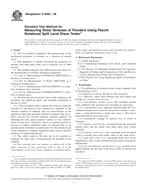1.1 This specification is intended to provide a characterization of the design and mechanical function of intramedullary fixation devices (IMFDs) specify labeling and material requirements, provide test methods for characterization of IMFD mechanical properties and identify needs for further development of test methods and performance criteria. The ultimate goal is to develop a standard which defines performance criteria and methods for measurement of performance-related mechanical characteristics of IMFDs and their fixation to bone. It is not the intention of this specification to define levels of performance or case-specific clinical performance of these devices, as insufficient knowledge is available to predict the consequences of the use of any of these devices in individual patients for specific activities of daily living. It is not the intention of this specification to describe or specify specific designs for IMFDs.
1.2 This specification describes IMFDs for surgical fixation of the skeletal system. It provides basic IFMD geometrical definitions, dimensions, classification, and terminology; labeling and material specifications; performance definitions; test methods and characteristics determined to be important to in-vivo performance of the device.
1.3 This specification includes four standard test methods;
1.3.1 Static Four-Point Bend Test Method – Annex A1 and
1.3.2 Static Torsion Test Method – Annex A2.
1.3.3 Bending Fatigue Test Method – Annex A3.
1.3.4 Test Method for Bending Fatigue of IMFD Locking Screws – Annex A4.
1.4 A rationale is given in Appendix X1.
1.5 The values stated in SI units are to be regarded as the standard.
Product Details
- Published:
- 01/01/2000
- Number of Pages:
- 18
- File Size:
- 1 file , 210 KB


